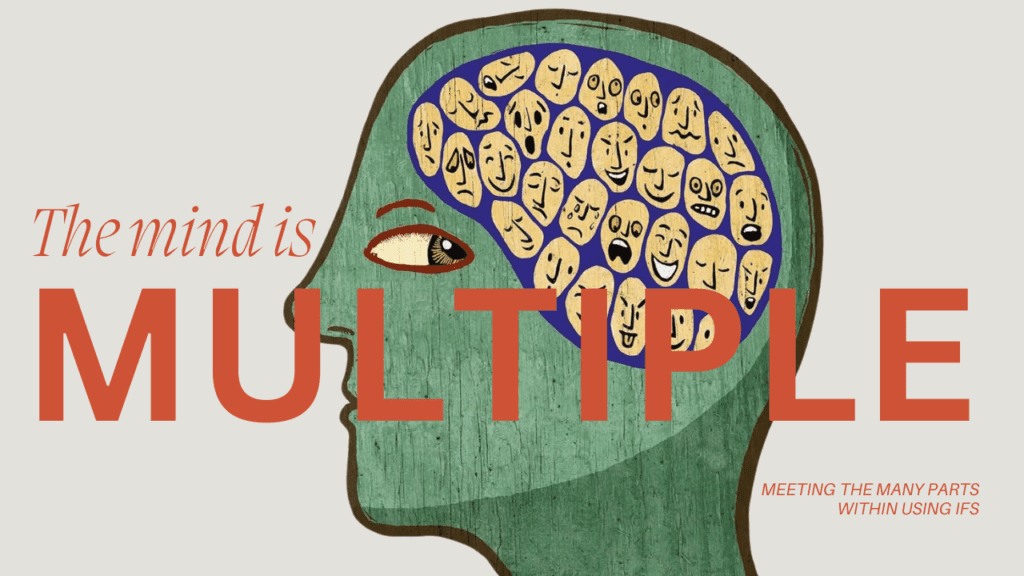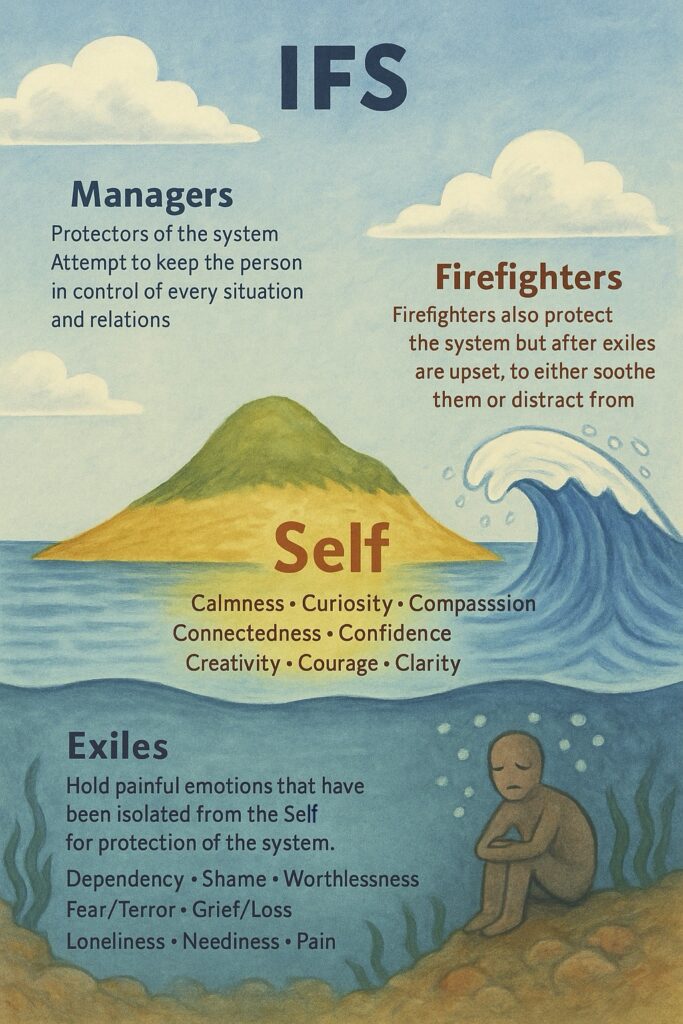
The Multiplicity of Mind
Internal Family Systems (IFS) begins with a quiet, radical assumption— the mind is multiple.
Dr. Richard Schwartz, a systems family therapist working with clients struggling with Bulimia, began to notice something striking in their language. As they described their experiences, they would say things like:
“A part of me wants to leave, but a part of me wants to stay.”
“A part of me hates myself. And another part just wants peace.”
These weren’t metaphors. They were maps.
How often do we find ourselves saying something similar?
A part of me wants to reach out. A part of me avoids that phone call.
A part of me wants to self-isolate. And a part of me just wants a hug— a reminder that everything will be okay.
A Shift from Fixing to Listening
IFS gives voice—and space—to these contradictory, yet deeply connected parts within us. It shifts us away from the traditional mono-mind model of therapy (change your thoughts to change your feelings) and invites us into something far more tender and complex: a system that honors our internal multiplicity.
Other frameworks are valuable too —cognitive reframing, mindfulness, meaning-making—and I draw from them often in my work. But what makes IFS unique is the compassionate assumption that we are all multiple, and that every part of us has a reason for being.
This idea isn’t new.
Philosophers and psychologists long before Schwartz—Jung, Assagioli, Perls, Berne—intuited the same truth: that the mind contains multitudes, that our inner life is layered and richly populated.
IFS builds on this legacy by offering a practical way to connect with those inner voices—not to silence them, but to listen, to witness, and to befriend.
The Core Principles of IFS
IFS is grounded in a few central truths:
- The mind is naturally subdivided into “parts.”
- We each possess a Self—a calm, compassionate internal leader.
- No part is inherently bad. Every part is trying to help in the only way it knows how.
- Parts form relationships with one another and can shift as the internal system reorganizes.
- Healing within impacts how we move through the world—and the world impacts us in return.
Three Different Parts: Managers, Firefighters, and Exiles
IFS identifies three primary roles among our parts:
Managers: Anticipate and control. Their motivation is to avoid pain by planning, perfection, and control. Common manager behaviors and traits include:
- Controlling
- Analyzing
- Criticizing
- Judging
- Caretaking
- Pessimism
- Planning
- Numbing
Firefighters: React and distract. They douse emotional pain through impulsive or numbing behaviors. Common firefighter behaviors and traits include:
- Abusing Substances
- Attempting Suicide
- Bingeing on Food
- Over-spending
- Affairs
- Dissociating
- Distracting
- Cutting
- Rage
Exiles: Carry our most vulnerable wounds. Often hidden away, they long to be seen, held, and heard. Common exile behaviors and traits include:
- Shame
- Isolation and Abandonment
- Sensitivity
- Anger
- Dependency
- Innocence
- Spontaneity
- Openness
Let me share an example of how this might play out:

Imagine Sam—who grew up in a chaotic household. One parent, a raging alcoholic; the other, overworked and emotionally absent. Early on, Sam learns that the world is unsafe and that connection is unreliable.
A part of him feels the deep pain of loneliness and abandonment.
Another part decides that trust is dangerous.
A protector part develops—a hyper-independent achiever who ensures he performs, excels, and never appears to need anyone.
When that old wound resurfaces, a firefighter part rushes in—maybe through binge-watching, staying busy, or numbing out—to extinguish the flames of emotional pain.
In Sam’s system:
- The Exile carries the pain of abandonment.
- The Manager is the perfectionist who stays in control.
- The Firefighter distracts and deflects.
Each one is doing its best to protect him.
A part is not just a temporary emotional state or habitual thought pattern. It is a discrete and autonomous mental system… with its own desires, style, and worldview. It’s as if we each contain a society of people, each of whom is at a different age and has different interests and temperaments.
Dr. Richard Schwartz
The Self
But underneath all these parts is the Self.
In IFS, Self energy is not something we earn or build—it’s something we return to. An expansive internal space, inherent in all of us, that remains untouched by trauma.
Schwartz describes Self energy through what he calls the “8 Cs”:
Compassion, Curiosity, Calmness, Connectedness, Clarity, Creativity, Confidence, and Courage.
Later, others added the “5 Ps”:
Presence, patience, persistence, playfulness, and perspective.
To experience Self is to feel whole—not because every part is healed, but because you are finally in relationship with them.
And from that place of Self, healing begins.
IFS Therapy for Trauma: A Different Kind of Path

If you’re navigating trauma and feel like you’re carrying parts of yourself you don’t fully understand—or parts that feel at war with each other—working with an IFS therapist for trauma may offer a new kind of path.
One that doesn’t rush you to fix or reframe, but helps you listen—gently, bravely—to your own internal system.
And if you’re curious about exploring that journey together, I’d be honored to walk alongside you. You can learn more on my page or reach out directly.
After all, healing doesn’t mean changing who we are…
It means coming home to all the parts we’ve carried, quietly, for so long.